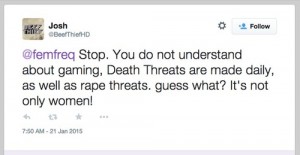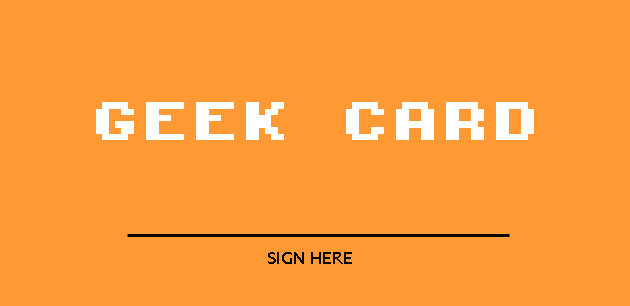A recent post on the Feminist Frequency tumblr titled “One Week of Harassment on Twitter” detailed just that — a week’s worth of tweets directed at Feminist Frequency, at Anita Sarkeesian, and at feminists in general, especially those associated in any way with gaming critique. Some are wildly ridiculous, almost funny, like this one, that promised to hack all Sarkeesian’s accounts her and “put gay porn everywhere” (the horror). Others are rife with threats of death and rape, to no one one’s surprise; the Feminist Frequency feed is full of threats on the regular. But there are common themes, despite the diversity of approaches: Sarkeesian is a liar, a conartist, feminists are trying to ruin gaming, and of particular interest to me, the notion that everyone gets threatened in gaming.
Sarkeesian addressed this herself on January 27, the day after the tracked week of harassment ended, saying such a statement is not a legitimate criticism. I’ll even take it a step further: it doesn’t matter whether or not threats and harassment are a part of gaming culture, particular in online gaming culture. What happens to women is different, and is much more serious.
When people talk about a culture of harassment in video games, particularly online video games, they’re talking about the long history of trash talk. We hear it (and perform it) in a variety of competitive endeavors, like sports and games, but it’s hardly limited to those spheres. However, in gaming and particularly online gaming, the trash talk can be severe, both in and out of games, with frequently threatening and insulting discourse. We all know it; we’ve all seen it, if we’ve ever so much as picked up a controller, put on a headset, or sat down at a table for a little Settlers of Catan. But there’s a deep and unsettling difference between a very general, “I’m gonna fuck you up,” and “you’re a fucking whore and I’m going to rape you until you die.”
Why? The first is general. Sure, we might hear insults that attack masculinity or one’s ability to conform to dominant standards, especially standards of masculinity, but there’s a particular dominance and erasure, grounded in sexism, that comes with so-called “trash talk” that centers in threats of rape and murder, one that seems bent on harming, silencing, or simply driving women out — and that’s certainly the case with Sarkeesian, as many of the examples she posted include hopes for her death, or simple calls for her to “leave games alone.”
 On this very issue, the University of Melbourne’s Jessica Megarry wrote last year* about the larger feminist sphere online, through a study of the #mencallmethings hashtag that allowed women to talk about and respond to the ways men tend to address them in digital discourse. Megarry establishes the general toxicity of certain types of digital discourse, but points out that the barrage of male voices and attacks online — despite the numerical dominance of female users — can have a damaging silencing effect on women because they attack not the individual women, but all women. She points to insults couched in descriptions of women’s bodies and sexuality, saying, “Such an attack on female bodies suggests that it is not a woman’s failure to adhere to the requirements of femininity that is particularly offensive or disgusting to men, but rather women themselves.”
On this very issue, the University of Melbourne’s Jessica Megarry wrote last year* about the larger feminist sphere online, through a study of the #mencallmethings hashtag that allowed women to talk about and respond to the ways men tend to address them in digital discourse. Megarry establishes the general toxicity of certain types of digital discourse, but points out that the barrage of male voices and attacks online — despite the numerical dominance of female users — can have a damaging silencing effect on women because they attack not the individual women, but all women. She points to insults couched in descriptions of women’s bodies and sexuality, saying, “Such an attack on female bodies suggests that it is not a woman’s failure to adhere to the requirements of femininity that is particularly offensive or disgusting to men, but rather women themselves.”
What’s the impact? As Megarry points out, there are both informational and economic benefits to using social media successfully, and if women are silenced or driven out, they are losing out on opportunities that may help them gain footholds that help move toward greater equality. Here, then, we see that online harassment is not just a personal matter, but can be a deeply affecting matter impacting quality of life for single women and entire swaths of women.
Jesse Fox and Wai Yen Tang of the Ohio State University also recently published data* from a study on perceptions of female gamers in online games, highlighting a number of sexist attitudes from male gamers — and, to those who would argue that many of Sarkeesian’s critics are “kids,” it should be noted that the subjects in the study were adults. “Given the prevalence of sexist beliefs about female players, it is unsurprising that female gamers have developed survival tactics to avoid negative experiences in-game. For example, many women report avoiding feminine screen names, female avatars, or voice chat functions that can reveal their sex.” Many of those tactics, of course, are silencing. Women may still participate, but they are shadows, unable to fully express themselves in an environment that does not welcome them.
And these are only two recent studies. Not only are there others, but with the fallout of GamerGate in particular, there are sure to be more forthcoming, if not already in the works. However, this information is so often swept down the halls of academia, with little mainstream light shed on the issues. Instead, we need more discussion, more efforts to analyze these patterns, so that we may combat them, lest more women are viciously attacked, like Sarkeesian, like Jennifer Hepler, for instance, and legions more who are not in the spotlight simply driven out.
While these two reports do not directly overlap, we see repeated patterns in the dominance of male voices in digital arenas and in potentially silencing and even damaging effects for women in terms of this particular kind of harassment. We cannot conflate targeted harassment of a woman (or all women) with general incivility in online discourse because not only are the bases not the same, but the impacts, too, are vastly different. In other words, we’re not talking about hurt feelings or trash talk here. We’re talking about pervasive, damaging behaviors that can impact an entire culture, and behaviors we rarely address or speak about honestly.
*Fox, Jesse, and Wai Yen Tang. “Sexism in online video games: The role of conformity to masculine norms and social dominance orientation.” Computers in Human Behavior V33. April 2014.
Megarry, Jessica. “Online incivility or sexual harassment? Conceptualising women’s experiences in the digital age.” Women’s Studies International Forum V47, Part A. December 2014.




